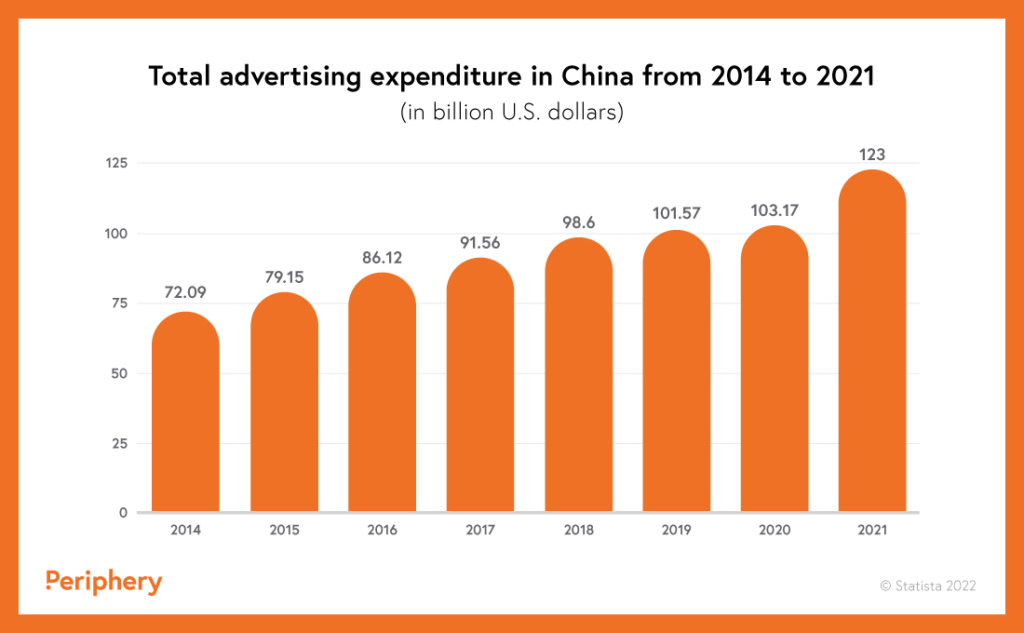When it comes to international markets, China has proven to be one of the most lucrative, but also one of the most highly regulated and controlled. All domestic or international companies are subject to strict laws that were restated in September 2015 to protect consumers from hyperbolic advertising claims. The Advertising Law of the People’s Republic of China, as it is known, was initially adopted in 1994 and strengthened in 2015 to prevent false or misleading advertising content. The Advertising Law applies to all Chinese and foreign companies operating within the People’s Republic.
If you can navigate these complex restrictions, you can tap into a large market — the second-largest ad market in the world — which could make all the difference for your business.
But failure to adhere to the rules can result in hefty fines.
If you enter the Chinese ad space unprepared, there could be significant consequences. Reading through this post will assist you in navigating through these complex restrictions.

Overview Of The Advertising Law as per the 2015 Enactment
As an entrepreneur, the first thing you need to know about running ads in China is that this region is a closed ecosystem and a strictly regulated market. Penalties for brands and businesses that don’t stick to China’s regulations can be severe. For instance, fines range from 100,000 RMB (about $19,329 CAD) to 1 million RMB ($193,291 CAD).
Repeat offenders should expect to pay even more, and you may have your advertising and business licenses revoked. It’s also worth noting that your advertising channels can enforce advertising standards. If you don’t follow Chinese advertising laws, sites like WeChat may blank some parts of your ad content or reject your ad outright.
Misleading Information
Above all else, the Advertising Law seeks to limit false or misleading information. The most straightforward aspect of this would be advertising a product or service which does not exist. If your product or service is authentic, then all you have to worry about is providing accurate information regarding its function, origin, quality, usage, and price. Failure to do so will have your advertising deemed “misleading,” running the risk of fines and damage to your brand’s reputation.
Superlatives
Some more obscure aspects of the Advertising Law relate to using superlatives in written copy. Your product or service cannot be “the best,” even if you think it is. Even Xiaomi Inc., now the 2nd largest smartphone manufacturer in the world, was not immune to controversy and was investigated in the latter half of 2015 for using the word “best” in its advertising. Words like “the most,” “the best,” and “the highest” are strictly forbidden and can attract a minimum fine of CAD$35,000.
Online Advertising
The Advertising Law is just as strict when it comes to online advertising. If you are advertising your products online, you must not interfere with the users’ “normal use of the internet.”
When using a “pop-up” advertisement to market your product, you must include clear instructions to close your advertisement in a single click. Email advertisements must reveal the sender’s identity and contact details and have a clear option for opting out of future correspondence; this is similar to the GDPR — the European regulatory body for email marketing.
Don’t Use the Wrong Map
You must always source a map of China from the government if you want to use it in an ad. Utilizing a different source can be viewed as an attempt to divide the country, which fouls numerous Chinese regulations.
Don’t Draw Direct Comparisons
The Advertising Act prohibits comparative advertising, meaning an ad cannot directly compare to specifically named products or services.
Don’t Use the Chinese National Flag and Anthem
Advertising Law bans using the Chinese national flag and national anthem and prohibits ads with content labeled detrimental to national interests or national identity. The same law prohibits advertisements that interfere with social stability or may harm public interests and good social norms. This sounds vague, and as a foreign company hoping to advertise in China, it is best to work with an experienced marketing agency such as Periphery Digital to navigate these complex nuances.
Don’t Use Call-To-Actions, such as “About to Sell Out”
Avoid language that seeks to manipulate your customers based on service/product price changes, availability, or quantity – including words like “about to sell out,” “no down payment if you purchase now,” or “the lowest price tag in history.”

Real Estate Ads
Chinese parents are particularly invested in the education quality granted to their children and will work to ensure children are enrolled in the highest quality schools. When buying a home, proximity to top-level schools is essential to the decision-making process. It’s common for real estate developers to want to use this as a critical feature in their ads. But caution must be exercised regarding the wording used in real estate advertising.
Your ad should, as previously mentioned, not be misleading or false and cannot contain any of the following:
- Suggestions that the property will see a guaranteed increase in value or ROI
- List prices that are against the Chinese government’s pricing regulations
- Generalized claims about surrounding infrastructure include “steps away from School X or Station Y.”
According to the Advertisement Law, walking speed varies from one person to another. Hence, it’s impossible to guarantee that person A may take the same minutes as person B to reach the same destination. Such advertisements are considered misleading. Likewise, it is impossible to know which products will increase in value, so guarantees of this sort are also regarded as deceptive or false.

What Are the Penalties for the 2015 Advertising Law?
When an advertisement is deemed misleading or false, the related industry and eCommerce authorities will issue directives to discontinue the ad’s publication. The authorities will then take the necessary steps to prevent the further public influence of the misleading ad.
Such ads often attract fines between three to five times the initial cost of the ad. Attempting to skirt these regulations or ride the line of what’s permitted can be unwise and very expensive.
In addition, your business license may be suspended as a penalty for violating the Chinese Advertising Laws. All businesses operating in China, local or foreign, must fully understand the country’s advertising laws. Such companies also need to understand the specific regulations for various goods and industries in the early stages of their marketing campaigns.
Final Thoughts
As marketing is synonymous with business longevity and profit growth, any company with an eye on the Chinese market must do their homework before launching their brand. The Chinese government is keen on regulating every sector and industry to strengthen consumer protection and sustainability, and the laws are always subject to change.
Despite the strict advertising laws imposed by the Chinese government, the People’s Republic of China remains one of the most vibrant and profitable consumer markets. The profit potential is there if you can approach it with the care and planning it calls for. It’s also understandable to be overwhelmed by these restrictions and feel like passing over what could be a massive opportunity for your business.
To ensure you’re operating on the safer side of the law and not missing out on potential profits, it’s best to work with an experienced agency like Periphery Digital that is familiar with the Chinese advertising landscape to ensure your ads are legal error-free. Contact us today to learn more.



